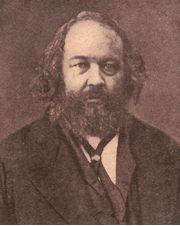On this date in 1814, Mikhail Alexandrovich Bakunin was born in Russia. He left the military to study philosophy, traveling as a young man to Paris, where he met Karl Marx and such artists and writers as George Sand and Proudhon. Bakunin participated in the French and German revolutions of 1848. The following year he was arrested, convicted and sentenced to death in Dresden for various revolutionary efforts. His death sentence was commuted, but he was then extradited to Austria, where he was tortured and beaten, convicted and resentenced to death. Again, his sentence was commuted to life imprisonment.
Bakunin was next extradited to Russia, where he spent 11 years in several notorious prisons, including exile to Siberia, before escaping. He eventually made his way via Japan to the United States. Bakunin lived in a variety of Western European countries, finally settling in Geneva in 1868.
He wrote his major works after his imprisonment, including Statism and Anarchy, 1872, in which he called for women’s equality, free education and the abolishment of hereditary property. His most notable freethought essay is “God and the State” (1883). In it, Bakunin called Jehovah, of all gods, “certainly the most jealous, the most vain, the most ferocious, the most unjust, the most bloodthirsty, the most despotic, and the most hostile to human dignity and liberty.” In this article, later published in English by Emma Goldman‘s Mother Earth Publishing (1916), Bakunin wrote: “All religions, with their gods, their demigods, and their prophets, their messiahs and their saints, were created by the credulous fancy of men who had not attained the full development and full possession of their faculties.”
The powerful manifesto averred that as long as there is a master in heaven, humans will be slaves on Earth. (D. 1876)


